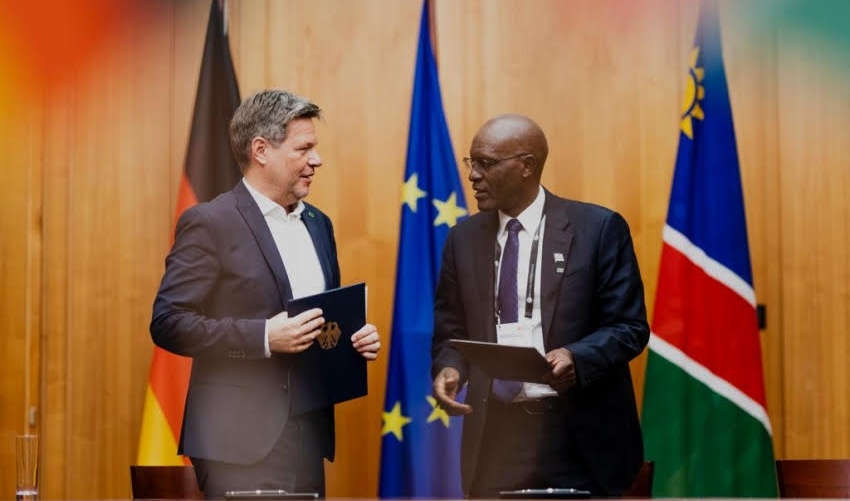
Federal Minister Robert Habeck appoints former State Secretary Rainer Baake as Special Representative of the BMWK for the german-Namibian Climate and Energy CooperationBaake is received in Windhoek by President Hage Geingob and discusses with Namibian government on building a hydrogen economy
Federal Minister Robert Habeck and Namibian Energy Minister Tom Alweendo concluded a cooperation agreement in the field of the hydrogen economy on 29 March 2022. To implement the agreement, Habeck has appointed former State Secretary for Energy Rainer Baake as Special Representative for german-Namibian Climate and Energy Cooperation.
“There is hardly a better place in the world to produce green hydrogen with the help of wind and solar energy,” said Economics and Climate Minister Habeck. Onshore wind turbines would generate even higher amounts of electricity there than offshore turbines in the North Sea. The generation of electricity from solar energy systems is almost three times as high as in Germany. “I am therefore very pleased that from now on the german-Namibian cooperation for green hydrogen has been initiated by the former expert and State Secretary. Rainer Baake.” Baake is currently on a 10-day trip to Namibia to discuss building a green hydrogen economy with the Namibian government. He was received by President Hage Geingob on Tuesday, 5.7. Previously, he had attended a meeting of the Namibian Cabinet. His talks focused on the implementation of a project planned by Namibia for the production of green ammonia in southern Namibia.
“Namibia will produce green ammonia, which we urgently need in Germany for the decarbonisation of our industry,” says Baake.
Germany is the largest consumer of ammonia in Europe. Ammonia is a key raw material in industry and is becoming increasingly important on the way to climate neutrality. Currently, ammonia is produced in Germany exclusively with the help of natural gas; production has accounted for 11% of industrial natural gas use in recent years and almost 6 million tons of CO2 emissions annually.
“A cooperation thus brings great advantages for both Namibia and Germany,” says Baake. “A real win-win situation!”
The production of hydrogen by electrolysis requires large amounts of water, which is particularly scarce in Namibia. Therefore, a seawater desalination plant powered by renewable energies is planned near the village of Lüderitz. At the same time, the plant is intended to supply the local population with sufficient clean drinking water.
Since hydrogen can only be transported cost-effectively by pipelines and not by ships, Namibia plans to further process hydrogen into ammonia with the addition of atmospheric nitrogen. A new port facility is planned for the shipment of the green ammonia.
A tender for the development of a first expansion stage of the project has been won by hyphen, a merger of the German company Enertrag and the South African company Nicolas Holding. Participation is offered to the Namibian state. The investment volume for the first stage of expansion roughly corresponds to the current gross national product of Namibia. The establishment of a green hydrogen economy has the potential for a significant economic upswing for the country on the southwest coast of Africa. During the construction phase, 15,000 new jobs will be created and 3,000 workers will be needed in the company. Namibia is working on the training and further education of local forces to be hired as a matter of priority.
According to Baake, however, there are two other major advantages. “We have agreed with the Namibian Minister of Energy on how the large wind and solar energy capacities for hydrogen production can be integrated into the Namibian electricity system. I see a great opportunity for Namibia to become the first African country with 100% renewable energy in the electricity sector before the end of this decade,” said Baake. The fourth advantage lies in the elimination of electricity imports from coal-fired power plants in South Africa. At last year’s climate conference in Glasgow, Germany and other industrialised countries pledged support to South Africa in phasing out coal-fired power generation. “The fact that exports of coal-fired electricity from South Africa to Namibia are disappearing represents a contribution to South Africa’s coal phase-out that should not be underestimated,” says Baake.
Read the most up to date Fuel Cell and Hydrogen Industry news at FuelCellsWorks




